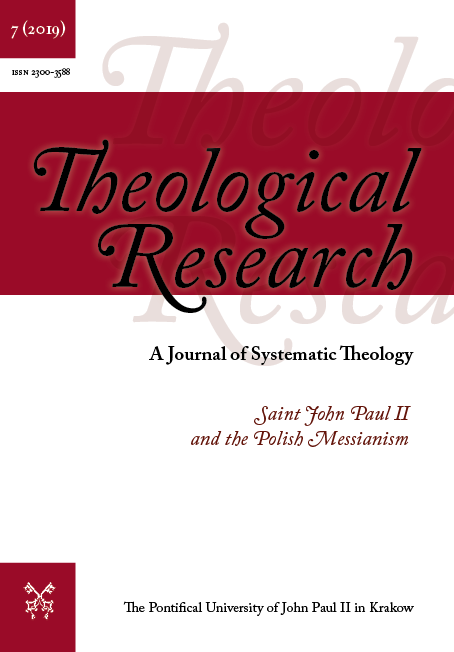Jean-Paul II : messianisme ou universalisme éthique ?
DOI:
https://doi.org/10.15633/thr.3953Słowa kluczowe:
John Paul II, theology of nation, liberalism, messianism, universalism, Polish romaniticismAbstrakt
Paweł Rojek in his book Liturgia dziejów [Liturgy of History] reveals the importance of the Polish romantic messianism for the thought of John Paul II. He carefully defends this tradition against the popular charge of heresy, and argue that in fact it preceded the formulation of Catholic social teaching and some crucial doctrines of the Second Vatican Council. In the longest chapter of his book, Rojek developes “Messianism of Work, ” an idea very close to me. For John Paul II the Eucharist was an inspiring symbol of cooperation of God and man in the history. In this paper, however, I rise some fundamental doubts concerning Rojek’s interpretation. First, he seems to adopt a false theology of nation in which nations are thought as kind of persons. Second, he suggests that John Paul II supported an alleged “third way” between communism and capitalism. Finally, he neglects the universalistic dimension of papal vision. In result, messianism in this interpretation might function not as dynamic universalistic utopia, but rather static, nationalistic ideology.
Bibliografia
Braudel F., Grammaire des civilisations, Paris 1987.
Frossard A., N’ayez pas peur ! Dialogue avec Jean-Paul II, Paris 1982.
Huntington S., The Clash of Civilizations and the Remaking of World Order, New York 1996.
Janion M., List do Kongresu Kultury, dans : Spór o mesjanizm, red. A. Wawrzynowicz, t. 2 : Recepcja krytyczna, cz. 2, Warszawa 2017, p. 210–212.
Jean-Paul II, Lettre encyclique Centesimus Annus, 1 mai 1991.
Jean-Paul II, Lettre encyclique Redemptor hominis, 4 mars 1979.
Kłoskowska A., Kultury narodowe u korzeni, Warszawa 1996.
Kundera M., Un Occident kidnappé, ou la tragédie de l’Europe centrale, « Le Débat » 27 (1983), p. 3–23.
Kundera M., Le Rideau, Paris 2005.
Masłowski M., Etyzacja polityki – naczelna idea polskiego romantyzmu, in : M. Masłowski, Problemy tożsamości. Szkice mickiewiczowskie i (post)romantyczne, Lublin 2006, p. 77–91.
Mickiewicz A., Skład zasad, dans : A. Mickiewicz, Dzieła, t. 12, Warszawa 1955, p. 7–8.
Mickiewicz A., Les Slaves. Cours professés au Collège de France 1842–1844, Paris 1914.
Miłosz C., Les Visions de la Baie de San Francisco, Paris 1986.
Mochnacki M., O literaturze polskiej w wieku dziewiętnastym, dans : M. Mochnacki, Rozprawy literackie, Wrocław 2004, p. 173–345.
Niemcewicz J. U., Pamiętniki 1811–1820, Poznań 1871.
Norwid C. K., List do Marii Trębickiej z maja 1854 r., dans : Pisma wszystkie, t. 8 : Listy 1839–1861, Warszawa 1971.
Norwid C., Prométhidion, trad. J. Pérard, Paris 1939.
Norwid C. K., Rzecz o wolności słowa, dans : C. K. Norwid, Pisma wszystkie, t. 3: Poematy, Warszawa 1971, p. 557–623.
Norwid C. K., Zmartwychwstanie historyczne, dans : C. K. Norwid, Pisma wszystkie, t. 6 : Proza, Warszawa 1971, p. 609–617.
Norwid C. K., Znicestwienie Narodu, dans : C. K. Norwid, Pisma wszystkie, t. 7 : Proza, Warszawa 1973, p. 85–92.
Ożóg K. S., Jan Paweł II. Uczestnik kultury : Pielgrzym, dans : Jan Paweł II, człowiek kultury, red. K. Flader, W. Kawecki, Kraków 2008, p. 213–225.
Pascal B., Pensées, Paris 1976.
Puzynina J., « Całość » Norwida, dans : J. Puzynina, Słowo, wartość, kultura, Lublin 1997, p. 460-478.
Ricœur P., L’Idéologie et l’utopie, Paris 1986.
Rojek P., John Paul II and the Polish Messianism. Introduction to the Liturgy of History, trad. par K. Popowicz, « Theological Research » 7 (2019), p. 9–27.
Rojek P., Liturgia dziejów. Jan Paweł II i polski mesjanizm, Kraków 2016.
Turnau J., Słowo papieża, « Gazeta Wyborcza » 24 décembre 2004, p. 2.
Pobrania
Opublikowane
Numer
Dział
Licencja
Autrzy publikujący w czasopiśmie "Theological Research" zgadzają się na następujące zasady:
a. Autorzy przenoszą na rzecz Uniwersytetu Jana Pawła II w Krakowie (UPJPII) autorskie prawa majątkowe do swoich tekstów.
b. UPJPII udostępnia teksty na platformie wydawniczej, na licencji Creative Commons Uznanie autorstwa-Użycie niekomercyjne-Bez utworów zależnych 3.0 Polska, która umożliwia ich pobieranie i udostępnianie (np. w repozytoriach naukowych), o ile zostaną spełnione warunki:
- podany autor i tytuł tekstu,
- podane miejsce publikacji (tytuł czasopisma i adres internetowy do oryginalnie opublikowanego tekstu),
- tekst będzie dystrybuowany w sposób niekomercyjny.

